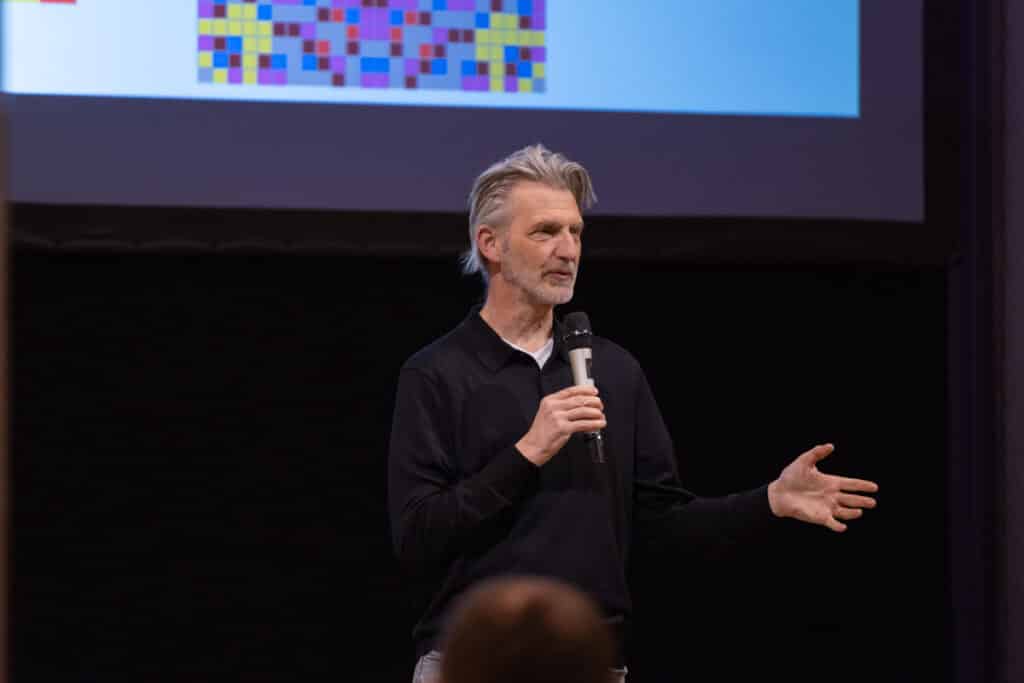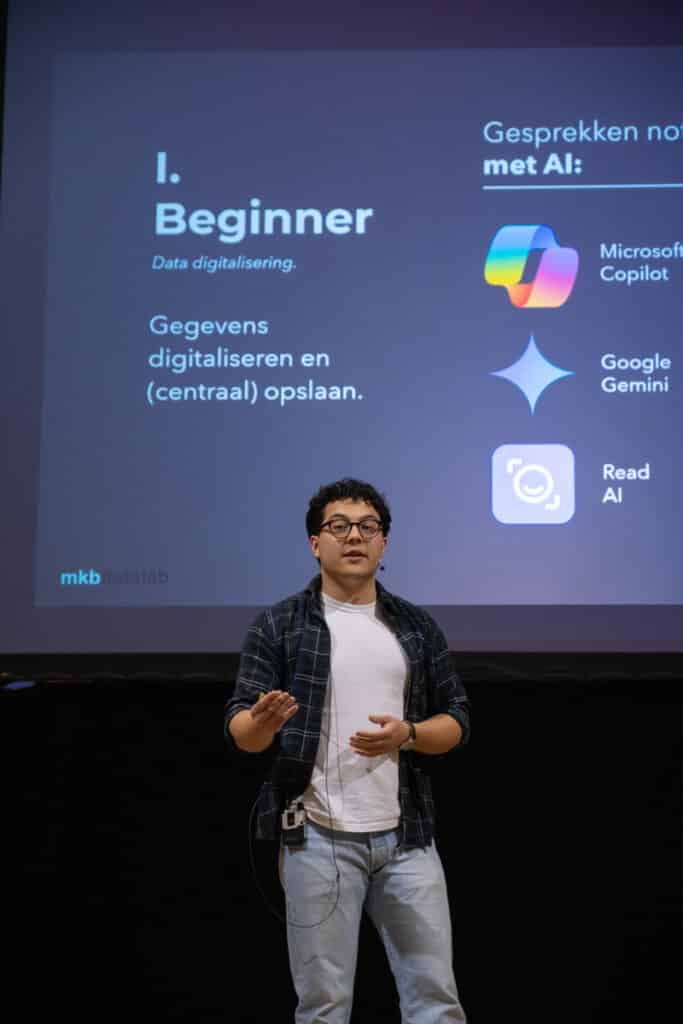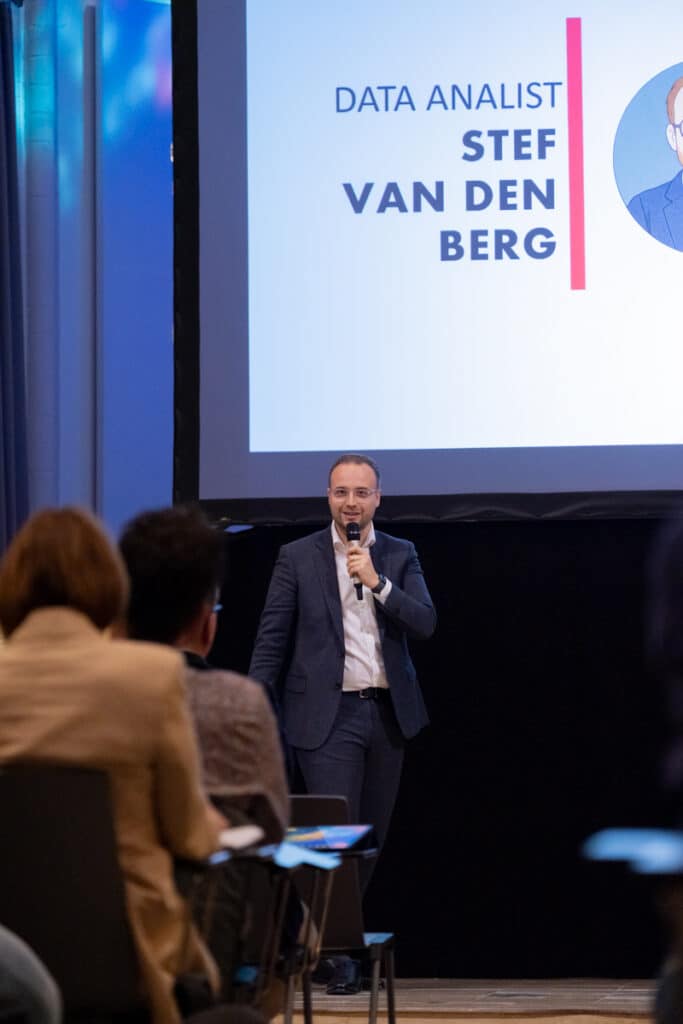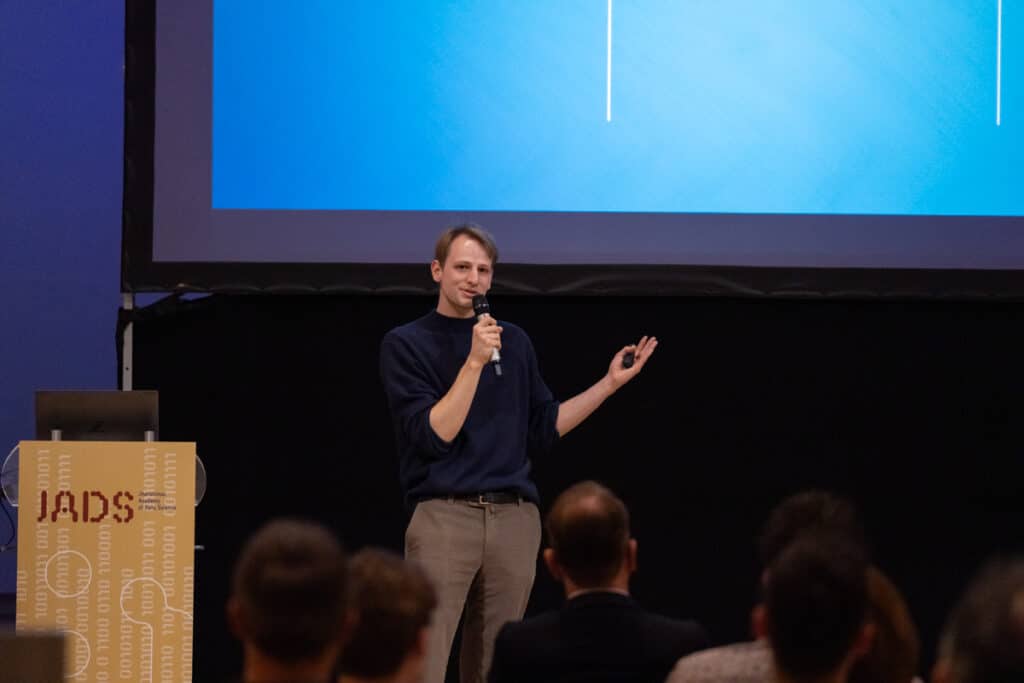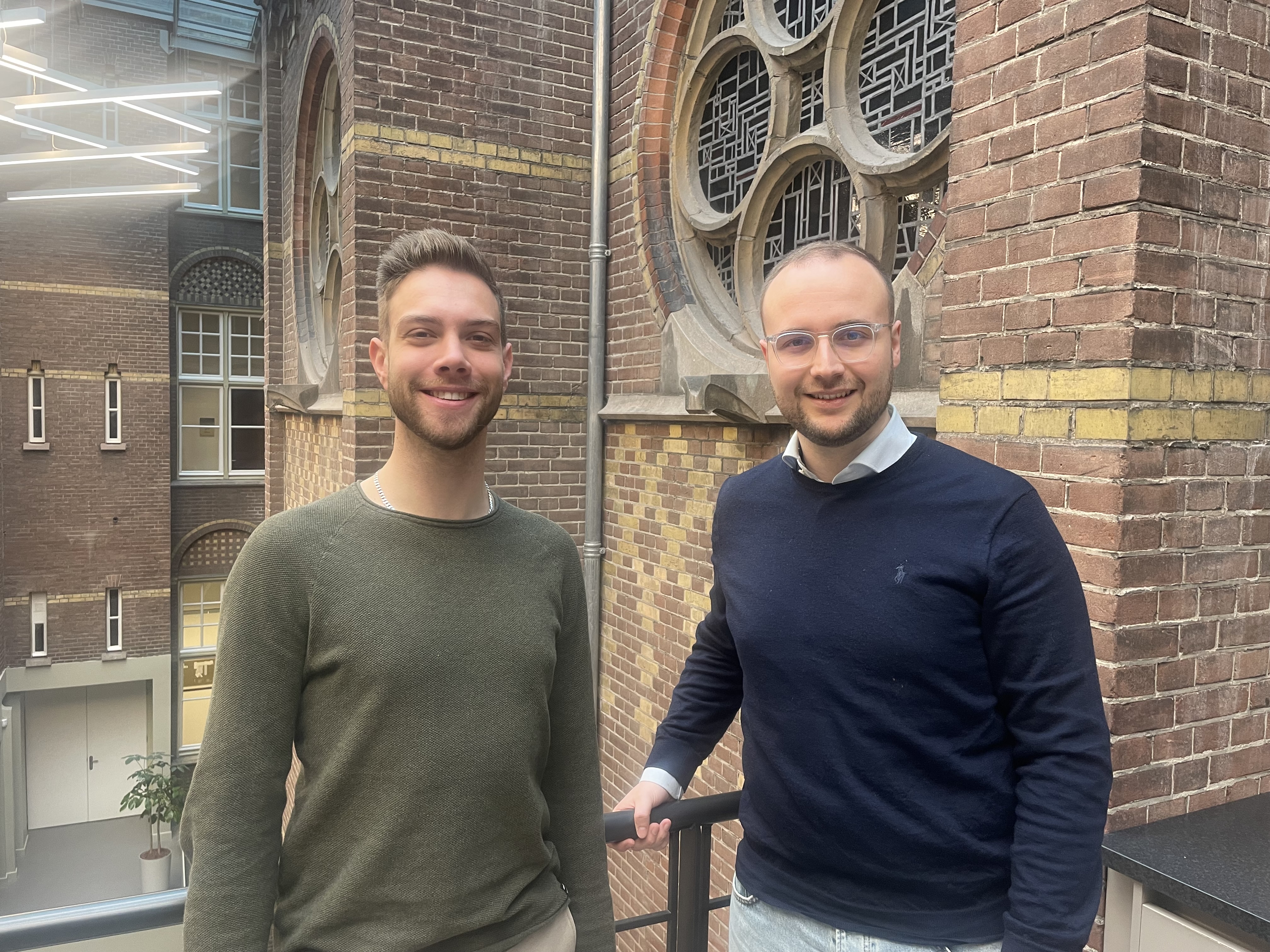Recap inspiration event – how SMEs are already getting value from data
Posted on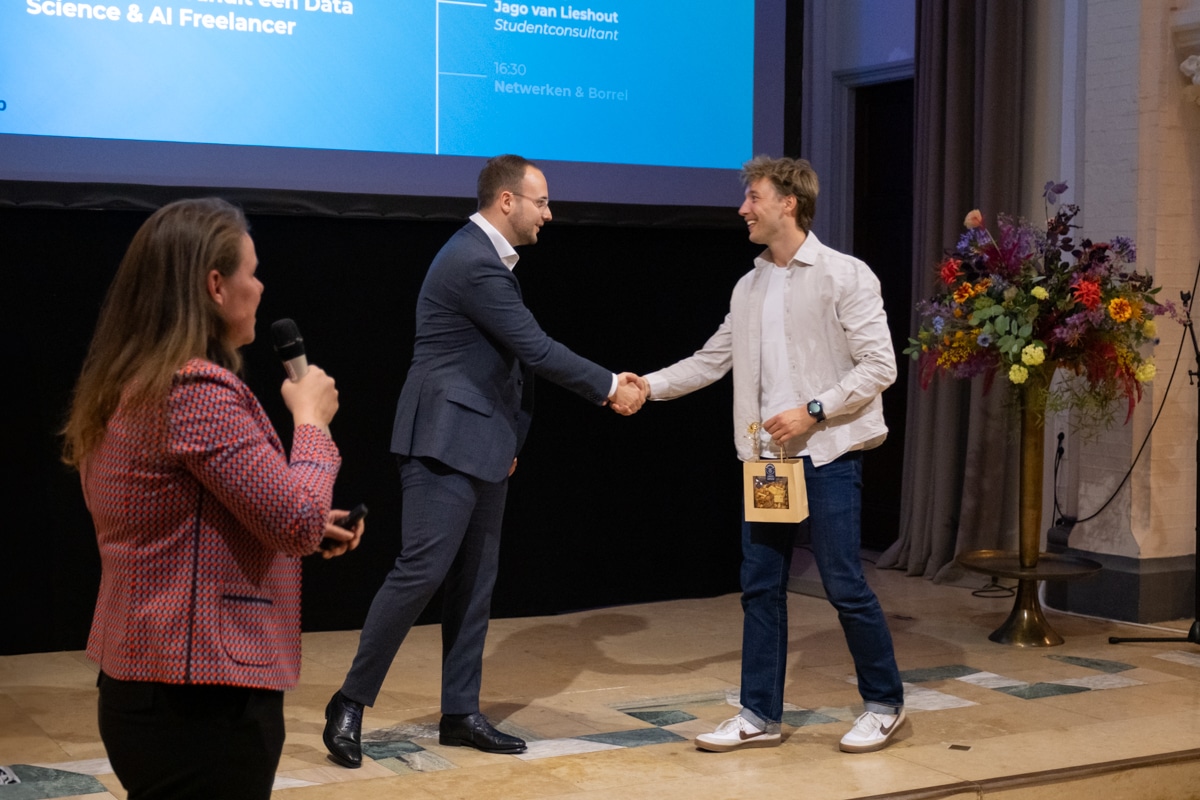
“What can AI do for my business?”
On April 9, 2025, some 40 entrepreneurs got a concrete answer to that question. During the inspiration event “Data Science & AI for SMEs: trends, opportunities & success stories,” organized by the JADS MKB Datalab, technology, realism and practice came surprisingly close together.
What made this afternoon special? No futuristic talk, but concrete examples of how data and AI are already being used today – in bakeries, consulting firms and ambulances. With sharp insights from scientists, honest stories from entrepreneurs and practical tools from the JADS kitchen.
Key note Eric Postma: Understanding AI starts with the brain
Professor Dr. Eric Postma kicked off the afternoon with a keynote that felt anything but academic. In just over an hour, he took AI out of the realm of hype and science fiction, and brought it back to what it is all about: pattern recognition, making choices, and understanding what machines can and especially cannot do.
“AI is not magic. It is extremely good at system 1 thinking: quick decisions, based on experience. But that system 2 – logical reasoning, conscious consideration – that’s where AI is far from being.”
Using Kahneman’s famous dichotomy (system 1 and 2), Postma explained why today’s AI systems, such as ChatGPT or DeepSeek, can seem so impressive – and at the same time so limited. They are fast, widely trained, and enormously powerful at recognizing patterns. But they don’t understand anything. They don’t reason. And they are not critical.
A few highlights from his talk:
- AI is a “grey box,” not a black box. We understand the algorithm, but not where exactly the knowledge resides. The logic is hidden in billions of numbers – and it is hard to deduce from that why an AI makes a particular choice.
- Machine learning does not lean on logic, but on examples. The shift from symbolic AI to learning systems was essential – and only really took off when enough data AND computing power were available.
- Deep learning is based on the brain, but very simplified. Artificial neural networks mimic the input-output processes of our brains, but lack everything that makes human thinking complex: emotions, context, self-reflection.
- AI often outperforms humans on narrow tasks. A trained model can recognize dog breeds better than an average animal lover. But it still doesn’t know what a dog is.
“What AI can do now sometimes seems smart. But it’s different from human intelligence. If you don’t understand that, you can’t work with it wisely.”
What should entrepreneurs make of this?
At the end of his presentation, Postma bridged the gap to practice:
“Play with it. Don’t rely on big promises, but see for yourself what works. Chat with an AI, give it a task, and see what comes out of it. That’s the quickest way to learn.”
His message was clear: see AI as a tool, not a threat or a panacea. Start small, stay critical – and use it to make your own work smarter.
JADS MKB Datalab: from insight to action
After the break, Jules and Virgil from the JADS MKB Datalab took over. Where Postma put the theory in sharp focus, they brought it directly into practice. The Datalab has now been involved in more than 380 projects in the SME sector. Their approach? No thick reports, but short sprints in which students work together with entrepreneurs on concrete data issues. From Excel problems to AI prototypes – it’s all about doing.
Some of the tools and insights they shared:
- Use AI as an accelerator, not an end goal. For example, when cleaning data, generating reports, or visualizing trends.
- AI agents? These are actually ways to automate, something the lab has been doing for a long time.
- Data quality is key. To put it bluntly: bullshit in equals bullshit out.Virgil closed his talk with a down-to-earth reminder:
“Anyone can get started with AI, even literally the baker around the corner – one of our first projects. In short, no question is too crazy for us”
Rademaker Advies: from workload to work value
Then the stage was set for Stef van den Berg, data analyst at Rademaker Advies & Accountancy. Not a tech startup or IT club, but a solid accounting firm that understands that the future does not come naturally.
Stef gave an insight into the challenges within accountancy:
- More and more regulations
- Ever higher expectations of clients
- And a structural shortage of good staf
“We get more work with the same number of people. Then you have to work smarter.”
And they do. In collaboration with students from the SME Datalab they built, among other things:
- A tool that automatically analyzes bank transactions, including identifying striking patterns and potential risks.
- A model that links employee hours and contract data to tax returns, so errors are spotted earlier.
- An AI tool that searches financial statements based on customer queries – similar to a local GPT.
The result? Hours of manual work reduced to minutes, more control over risks, AND room for real customer relationships.
“We’re not using AI to replace people. But to give people more time to add value. That’s the profit.”
What started with one pilot project grew into a structural data team. They now use AI tools as standard within their services – and are even experimenting with local language models that can analyze privacy-sensitive data without anything going outside. And fun fact: they hired the student from JADS right after getting his Masters at JADS!
The student’s move: Jago van Lieshout
Finally, student consultant Jago van Lieshout shared what it’s like to work as a JADS student in the middle of SMEs. He showed that students are not interns getting coffee, but real change makers.
From a dashboard for lingerie sales to an AI model that analyzes ambulance rides for anomalous travel times – the common thread is the same every time: small demand, sharp analysis, big impact.
“The best projects start with the question ‘we want something with AI,’ something that is a very logical starting point. However, to make the most impact and get the most out of a project, it is important to keep asking: Why, why, why? With the answers, you get to the root of the problem.”
His advice to entrepreneurs: start with what you know, and work from there. “You don’t have to be a data guru. You just have to be curious about what can be improved.”
AI is not complicated. It is relevant.
The event closed with networking drinks – and ‘bitterballen’. But the conversation went on for a long time. About tools, opportunities, barriers and plans. Because one thing became clear to everyone:
AI is not something for later. It’s here now. And if you as an SME know where you stand, you also know where to start. From professor to baker, accountant to student – the message resonated through all the stories:
Don’t wait until the AI hype is over. Use it, test it, learn from it.
Your data has value. Do you also have a feeling that your work could be better and smarter? Then contact us at info@jadsmkbdatalab.nl or check out all the possibilities at https://www.jads.nl/nl/bedrijven/jads-mkb-datalab/.
